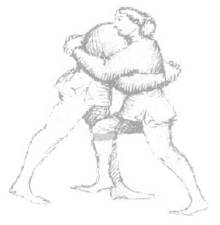Overhook
In wrestling, an overhook, also called a whizzer, is a clinch hold that is used to control the opponent. An overhook is performed from any direction by putting an arm over the opponent's arm, and encircling the opponent's arm or upper body. Having an overhook with one arm is called a single overhook, while having overhooks with both arms is known as double overhooks. Overhooks are typically employed in response to underhooks by an opponent.


| Overhook | |
|---|---|
 | |
| Classification | Clinch hold |
| Style | Wrestling |
| AKA | Whizzer |
Single overhook
A single overhook can be used to take an opponent down. The protagonist hooks over one arm of the opponent, simultaneously moving to that side of the opponent, often while holding the opponent's other upper arm or elbow with his other hand. He puts his weight on the opponent's hooked arm, forcing him to the ground, and then steps over the opponent's back.
Double overhooks
The double overhooks are generally considered inferior to double underhooks, and are often used in response to double underhooks by the opponent. If the opponent's hands can be locked to the opponent's body it is possible to advance into a bear hug, with the opponent's arms pinned. Most commonly however, the overhooks are used to prevent the opponent from advancing into a bear hug, by locking the double overhooks around the opponent's double underhooks.
See also
- Bear hug
- Collar-and-elbow position
- Collar tie
- Pinch grip tie
- Over-under position
- Underhook
References